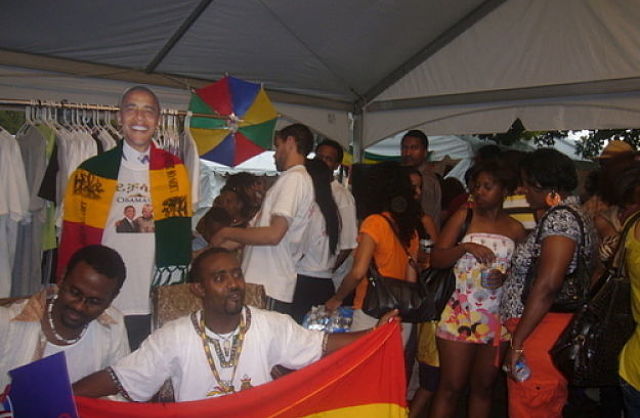 Image from past Ethiopian soccer tournament and cultural festival in Washington, D.C. (File photo/Tadias)
Image from past Ethiopian soccer tournament and cultural festival in Washington, D.C. (File photo/Tadias)
Tadias Magazine
By Tadias Staff
Published: Saturday, July 4th, 2015
New York (TADIAS) — Recently the Washington Post has editorialized about President Obama’s upcoming visit to Ethiopia citing that it is ill-timed and that it ignores the country’s abject record of human rights violations, which includes the arbitrary jailing of journalists and bloggers. They have also covered the recent rally in front of the White House and interviewed activists and several individuals in the DC community. And while we support and commend these efforts — it is high time that mainstream US media cover the Diaspora’s decades-long concern regarding the deterioration of freedom of expression in Ethiopia — we strongly resent Washington Post Reporter Pamela Constable’s simplistic conclusion that the “sharp division” in opinions can be reduced to Amhara and Tigrayan ethnic group affiliations, or even which restaurants Ethiopian Americans choose to frequent in the Washington DC metropolitan area.
For too long mainstream American media expects ethnic communities such as ours to be grateful that they have covered our “issues” or given our concerns a national spotlight even when the coverage is less than nuanced. We would like to draw Ms. Constable’s attention to the work of reporters such as Goorish Wibneh, writing for the Seattle Globalist, who likewise covered Ethiopian American perspectives on President Obama’s upcoming trip citing conversations with an Ethiopian businessman who came to the U.S. in 1971, a PhD student who arrived in America as recently as 2003, and an Ethiopian American who works with a community initiative — all without feeling compelled to reduce the interviewees’ support or opposition of the trip by emphasizing their ethnic affiliations. Wibneh has also excellently covered additional human rights concerns held by the Ethiopian Diaspora community regarding the plight of Ethiopian migrants in the Middle East.
Ethiopian American diversity consists of more ethnicities and languages than the Washington Post reporter cares to acknowledge, and a quick stop at the annual Ethiopian soccer tournament being held in Maryland this week, for example, could have easily made this diversity obvious to her. Is it too much to ask that a Washington Post reporter venture beyond two cafes and reach out to Ethiopian community centers, academics, houses of faith, festivals, or even the vibrant Ethiopian Diaspora media organizations found in the nation’s capital and across the US? Had this effort been considered we wouldn’t have had to read the negligent assertion in Constable’s article making government opposition or support an issue merely between two ethnic groups, and ultimately depicting the work of community activists as less than what it truly stands for – a movement for dignity for all persons and an unequivocal belief in the fundamental respect for human rights.
Moreover, Pamela Constable describes the Ethiopian American community in Washington DC area as consisting of an “emigre community of 35,000 — the largest concentration in the United States.” We are hard-pressed to say that the Ethiopian American community consists of just its foreign born population. We are not simply a bunch of recently arrived immigrants who are hard to reach unless one visits our restaurants. Ethiopians have resided in the United States, in large numbers, since the 1970s, and according to DC-based Migration Policy Institute, if the U.S.-born Ethiopian population is included “the estimates range upwards of 460,000 in the United States” and approximately “350,000 in Washington DC” region. While these numbers are not fully verified by the census, the voice of US-born Ethiopians is equally important to recognize when writing about community views in Washington DC.
Ultimately, Pamela Constable’s efforts are well-intentioned, but in the age of social media, where a plethora of perspectives are widely and easily accessible, it is no longer enough to be well-meaning. As a major media institution it is critical to also include nuance. The coverage of the Ethiopian American community needs to go beyond the stereotypical reporting of us as refugees and include the voices of the new generation of Ethiopian Americans who see themselves as part of the modern-day American tapestry and are active in influencing US foreign policy towards Ethiopia.
We hope that in the future the Washington Post provides a highlight of the Ethiopian Diaspora that is more than a rushed stop to U Street, and does not explain away or trivialize our human rights concerns as inevitably tied to our ethnic affiliations. There are plenty of us whose support or opposition crosses ethnic lines, just as there are plenty of us who were born in the United States and who are proud of our Ethiopian heritage and consider ourselves core members of the Ethiopian community.
—
Related:
D.C.-area Ethiopians say Obama trip will send wrong signal to repressive regime in homeland
Obama Visit to Ethiopia Brings Fresh Eyes to the Country, Say Seattle Ethiopians
Mr. Obama’s visit to Ethiopia sends the wrong message on democracy (Washington Post)
In Ethiopia, Why Obama Should Give Due Credit to Haile Selassie’s OAU Role
Breaking News: President Obama to Travel to Ethiopia in Late July
Meet the 2015 Mandela Washington Fellows from Ethiopia
Brookings Institution Recommends Obama Visit Kenya, Ethiopia & Nigeria
Join the conversation on Twitter and Facebook.

























